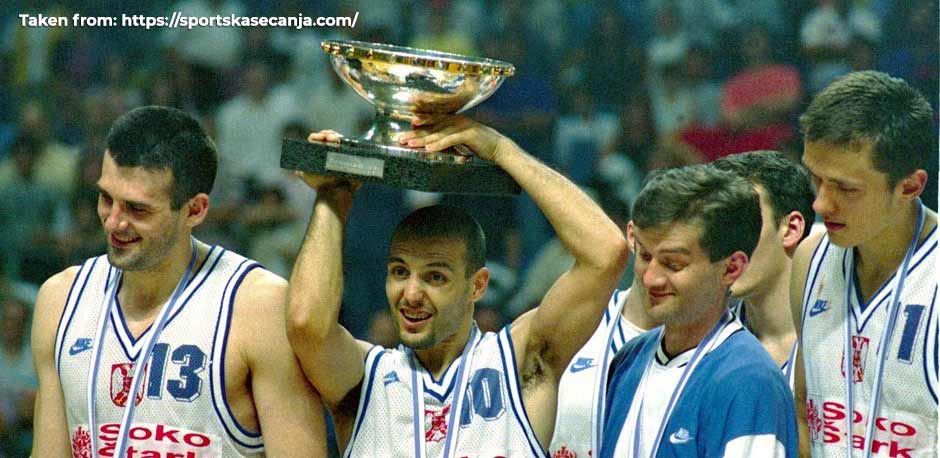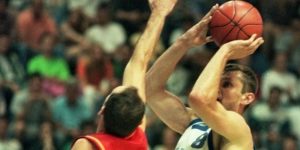Serbian national basketball team – a way back machine!
Great move now by Marciulionis (FIBA EuroBasket MVP). He scores his 12 points! Djordjevic takes the ball under the basket, passes to Obradovic, Obradovic launches the counterattack by throwing a great whole-court pass to Danilović who is in the run, Danilovicm Danilović…. ohohohoo, this is for EN, BE, Aay, this is what would be said "In your face". Great dunk by Danilović over Sabonis….
That was a great final game of the European Basketball Championship where the Yugoslav national team defeated Lithuania’s national team with a score of 96: 90. It was a game where the great Aleksandar Djordjevic scored 41 points, hitting as many as 9 three-pointers from 12 attempts! It was the final where the Lithuanian giant and master of basketball remained on the poster of Predrag Sasa Danilovic. It was the final that returned the Yugoslav national team to the basketball map of the world, the final that gave the nation tormented by the war unforgettable moments of happiness.
Even though I was a kid at the time, I remember well the points I scored in my imagined games. 3, 2, 1…. There is a three for the victory, there is a three for the victory…. There is no time for anything anymore, Yugoslavia is the world champion! How many finals did I solve then? And not just me, back then every kid “was hitting those shots”, that is what I am sure of! Yugoslav aces such as Danilović, Đorđević, Bodiroga, Divac, Savić and many others are “responsible” for that. The generation that became the most dominant European national team in the most difficult conditions. A national team that restored faith and smiles on the faces of a nation tormented by war.
Serbian basketball team - the period after the war
“The country of basketball” has been waiting a long time for the return to the big basketball scene. Namely, due to the political crisis and the war, Yugoslavia was suspended from the World and European Championships. The Olympic Games in Barcelona were also missed. The return to the big stage was long overdue, until 1995, when the Secretary-General of FIBA, Mr. Borislav Stanković, made personal efforts, saying out loud what everyone already knew - World of Basketball needs Yugoslavia!
Although Serbia and Yugoslavia have a rich basketball tradition, I started this basketball time machine in 1995. It was in 1995 that Yugoslavia was returned to the basketball map after isolation. The foundations were laid for the creation of the most dominant European national team, which won the same number of medals from the championship in Greece in 1995 to the next 4 European championships, of which as many as 3 were gold.
The fallout of SFR Yugoslavia
The beginning of the civil war on the territories of the former SFRY also marked the disintegration of the federation. The former state had 23 million inhabitants, had a well-known basketball school, a very developed basketball infrastructure and it was a real nursery of basketball talents. At the previous World Cup, Yugoslavia won a gold medal in front of the national teams of the Soviet Union and the United States, and only 2 years earlier, a silver medal at the Olympics. A powerful team was formed with already accomplished super-talented basketball players such as Zdovac, Radja, Obradovic, Kukoc, Divac and Drazen Petrovic. New super-talented players like Djordjevic were building their name in basketball and waiting for their chance to shine in the national jersey. Unfortunately, a civil war occured and the fallout of the former big country followed. The powerful national team, from which a lot was expected, fell apart, and the former national team colleagues could now only watch the Croatian national team in the campaign for medals.
Serbian national basketball team - golden years after 1995.
After the fallout of the SFRY, a new community was created consisting of the remaining republics, Serbia and Montenegro. The first big tournament that the newly formed national team played, was the famous European Championship in Athens. The selector Duda Ivković led the "Blues" (long-term nickname of the national team) to the gold medal. The difficult situation in the country was reflected on the national team as well. Namely, due to the lack of sponsors and the generally poor financial situation, the national team was without jerseys. One of the solutions was to "borrow" jerseys from the women's selection, which was certainly not possible for many players. Mr. Duda Ivković did an unusual thing at that time, personally financing the purchase of white and blue sets of jerseys. The "Nike" jerseys that were purchased at the time were without the last names and sponsors, which were added later in the tournament. Before the national team for which Bodiroga, Danilović, Obradović, Stevanović, Paspalj, Berić, Đorđević, Rebrača, Divac, Savić, Tomašević and Koturović played, the national teams of Greece, Lithuania, Italy, Sweden, Israel, and Germany fell in order. Yugoslavia finished the group competition undefeated in the first place. In the quarterfinals, the French national team was an easy bite for the "Blues". Greece was defeated in the semifinals. An old acquaintance was waiting in the final - the Lithuanian national team led by the great Arvidas Sabonis and Marciulionis, the stars of the NBA league. In the already described final, the Yugoslav national team, led by the great Djordjevic who scored 41 points, defeated Lithuania 96: 90. The victory in this anthology final laid the foundations for the golden generation that had success in 2002 and the victory over the American "Dream Team"at their home ground in Indianapolis.

Author: sportskasecanja.com
Serbian National Basketball Team - 1996 Olympic Games
Winning the European Championship in 1995 in Athens gave the "Blues" an additional impetus. It was the return of the Olympic Games, in which, after winning the European Championship, direct participation was achieved. As we were deprived of watching the Yugoslav national team in 1992, the nation eagerly awaited the performances of the national team at the Olympic Games. A match with the United States national team was awaited for a long time. The entire nation hoped to meet the "Dream Team" in the finals of the Olympic Games. So, it was! The national teams of Yugoslavia and the United States met in the final. The great captain of the Yugoslav national team, Zarko Paspalj, carried his team in the first half. The favored Americans did not have a solution for Zarko, who hit the shots from all possible positions. However, the excellent resistance of the Yugoslav national team and the uncertainty were interrupted in the middle of the second half after an exclusive personal mistake by one of the best players, Vlade Divac. Afterward, the strong resistance was soon broken, and the Americans easily brought the game to an end, winning the result 95: 69.

Author: https://www.euroleague.net/
The basketball team of the Serbian national team at the 1998 World Cup - confirmation of quality and continued dominance
1998 brings us back to the place of success - the World championship in Greece. Although in the past years, the Yugoslav national team proved to be a basketball superpower, due to numerous dismissals of basketball players, there was a little bit of fear for the result. Due to the announced "lockout" in the NBA league, Vlade Divac missed the championship. Due to the injury, one of the best players, Predrag Danilović, could not wear the national team jersey, and for the same reasons, the performance of captain Đorđević was questionable. However, despite numerous problems, the "Blues" dominantly passed the competition in the first group stage. A convincing game was shown in the next group as well, when the national team of Canada was convincingly defeated with 99: 54. The only defeat that had no competitive significance was from Italy. In the quarterfinals, the national team was waiting, which was on the rise and which will represent a serious rival and competitor for the brightest medals in the years ahead. Greece was waiting in the semifinals. Motivated by the desire to redeem themselves in front of their audience for the numerous defeats from the selection of Serbia, the Greeks played a fantastic match. Yugoslavia won mostly thanks to Dejan Bodiroga and advanced to the finals, where the Russian national team was waiting. The Russians previously defeated the team of the United States of America, for which players from the NBA league did not play (for the same reason as Divac). The uncertain finale was really exhausting. "Hell's" defenses were played and the game with a small number of points ended with the victory of the Yugoslav national team with the result 64: 62. A great performance was provided by Zeljko Rebraca and Dejan Bodiroga, who was later named the best player of the tournament.
European Championship after the bombing of Yugoslavia in 1999
It did not take long to re-isolate the country after the civil war of the early 1990s. Soon, at the end of 1998, Serbia's relations with the international community and sanctions were strained. The culmination of the crisis resulted in the bombing of Yugoslavia in the spring of 1999. The performance of the national team at the European Championship in France was uncertain almost until the very beginning. The "Blue" championship starts in a renewed lineup with the help of experienced Danilović and Divac, who are returning to the national team. The selection of Yugoslavia continued with dominant performances. However, the Italians stopped the "Blues" in the semifinal match, so that after years of continuing to win gold medals, Yugoslavia was satisfied with winning bronze.
Stay tunned for the rest of the story next week!












